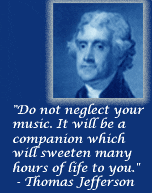
Where do you get your classical music?
By Ralph Graves
Anne Midgette, classical music reviewer for the Washington Post has a survey going on her blog. How do you get your classical music?
UK reviewer Jessica Duchen has some interesting thoughts in reaction to the survey. She outlines (for her) when CDs are best, when the radio’s the choice, and of course, live performances.
Personally, I pick up classical music everywhere. One of the things I like about WTJU is that no two announcers are alike — so I hear a large variety of music over the course of the week as each DJ presents the compositions and recordings they prefer. I also read a lot of reviews, mostly Gramophone and BBC Music Magazine, which keeps me up on new releases and sometimes leads to the discovery of new composers and works.
As far as owning classical music goes, I prefer CDs. That’s not to say I don’t have a digital library. I do. But it’s a digital library on my terms. Let me explain.
There are several things I like about classical CDs.
1) Liner notes — especially important for vocal music. Its difficult to fully appreciate a vocal work in a foreign language without a libretto (and translation).
2) Backup — hard drives fail. I’ve had three fail so far, and lost many files (I now do regular backups, but still). If all of my music only exists digitally, then a good portion of it will be gone forever (and there’s some tunes that Iwon’t miss). I like having hard copies of the important stuff.
3) Sound Quality — Classical music, more than other genres, rely on very subtle harmonic and timbral shadings that tend to get lost with heavy file compression. OK, some classical music can be bought with sampling rates of 256kbps (about double the normal MP3 bitrate), but there’s still a lot missing. Especially when you consider that file is only about a fifth of the size of the origianl from a CD.
By ripping my own discs, I get to decide on the sound quality (which for me is Apple Lossless).
4) Creative Control — Downloads were designed for popular music, and all of the organizational tools are oriented in that direction. Try finding classical selections on most download sites — it’s a mess. Missing opus and catalog numbers render titles virtually meaningless. Performer fields may have the performer, or perhaps the composer. In some cases the composer’s not even listed.
When I rip CDs, I can set the data fields to show what I want them to. My classical music files are always easy to find, and search.
5) Too Much Music — Again, digital music programs were designed for 4-minute songs, not 2-hour operas. Purchase a symphony as a download, and you get four separate tracks (billed separately, too). Want to hear them in order? You’ll need to create a folder for them, and you can only hear the movements in sequence if you select that folder.
In iTunes, I can join consecutive tracks on a CD before importing. So the movements of a symphony are always locked together and treated as a single work in my iTunes library — even on shuffle play.
But there’s a drawback. I can only join together tracks from a single disc. So the best I can do with a 2-disc opera is create two files. But I can’t join them together once I import them.
So my solution is just to leave the operas out. I’ll pull in the overtures, but if I want to hear a complete opera, I’ll just to have to pull the CDs off the shelf, and open up the booklet to follow along.
But that’s not necessarily a bad thing at all.
So you do you get your classical music? Check out the survey and see where you stack up.

